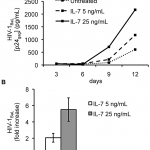hiv
Yesterday, US Secretary of State John Kerry marked the 10th anniversary of the creation of PEPFAR, the US President's Plan for Emergency AIDS Relief. President George W. Bush launched PEPFAR in 2003 with an initial $15-billion, five-year commitment to provide antiretroviral therapy (ART) to HIV-infected people in developing countries.
This month, Kerry announced, the one millionth baby will be born HIV-free to an HIV-positive mother because of PEPFAR support. US Global AIDS Coordinator Eric Goosby spoke to AFP about this achievement. AFP's Jo Biddle writes:
The program was working to "…
Student guest post by Carrie Ellsworth
During the summer of 2010 I spent two months in Ghana studying a parasite called schistosomiasis. We worked in a small town called Adasawase to determine prevalence and treat the schoolchildren who were infected. We were told that schistosomiasis was not a major health concern for the people in the town because they were often faced with other diseases that had more immediate and severe health consequences than a parasitic infection. It became apparent that if we wanted the people of this small town to take this health threat seriously, we needed to…
It's time for this year's second installment of student guest posts for my class on infectious causes of chronic disease. Third one this round is by Jack Walsh.
The Human Immunodeficiency Virus (HIV) infection is one of the most significant global health challenges of this 21st century. Since the isolation of the virus in 1983, it has infected 70 million people among whom 35 million have died of Acquired Immunodeficiency Syndrome (AIDS).1 Although important progresses have been made in slowing down the pandemic and reducing the morbidity and mortality related to HIV/AIDS with…
Ever wondered if we could identify someone by their breath? How fast you can propel a rocket using fusion power? If you can shoot at a plane with lasers and cause the pilot to burst into flame? Watch AskScience Live!
Despite some technical hurdles with the G+ event, I'd say it went well last night. If you weren't able the join us live, the video is now up on youtube.
It's my birthday today, and if you didn't get me anything, you can make it up for me by just watching this :-)
Fifth of five student guest posts by Jonathan Yuska
The saying, “The more you know, the more you can control,” is no more meaningful than when used in the context of HIV detection and prevention. Public health advocates endlessly stress the need for knowing one’s status; and one would assume that any way in which the most amount of people can be tested would be beneficial for the population1. The Food and Drug Administration shared this same idea when they overwhelmingly approved the first ever over-the-counter (OTC) HIV testing kit in 20052; which in theory, sounds like a promising…
Second of five student guest posts by Nai-Chung N. Chang
Tuberculosis (TB) is a major disease burden in many areas of the world. As such, it was declared a global public health emergency in 1993 by the World Health Organization (WHO). It is a bacterial disease that is transmitted through the air when an infected individual coughs, sneezes, speaks, or sings. However, not all individuals who contract the disease will display symptoms. This separates the infected into two categories, latent and active. Latent individuals are non-infectious and will not transmit the disease, whereas active…
One of the things that bugs me most in pop-sci and woo-woo science is the obsession with "boosting" the immune system. The immune system is in a constant balancing act - tip it too far one way and even normally harmless bacteria become life-threatening. But tilt it too far in the other direction, and you can end up with things like allergies and autoimmunity. And some pathogens have learned to take advantage of your normal immune responses, meaning that "boosting" your immune system can sometimes do more harm than good. A good case-in-point is a recent paper published in PLoS Pathogens:
IL-7…
December 1 was World AIDS Day, and this year's theme is "Working Together for an AIDS-Free Generation." In the 2011 United Nations Political Declaration on HIV and AIDS, countries set ambitious goals to reach by 2015:
Reduce sexual transmission by 50%.
Reduce HIV transmission among people who inject drugs by 50%.
Eliminate new infections among children and substantially reduce the number of mothers dying from AIDS-related causes.
Provide antiretroviral therapy to 15 million people.
Reduce the number of people living with HIV who die from tuberculosis by 50%.
Close the global AIDS resource…
Alexander Pope wrote "Hope springs eternal in the human breast," but cancer isn't far behind. Yet when hope springs, it can lead the sick to the unproven, to more dire disease, and death. On Respectful Insolence, Orac tells the stories of two women—one Kenyan, one American—who avoided modern treatment for their breast cancers. Orac writes, "Neglected tumors like this often bleed or rot—or both. It’s truly horrible to behold, and at this point there is nothing a surgeon can do except to recommend local wound care and hope that the chemotherapy works." Sometimes it's not…
Could HIV soon follow in the footsteps of smallpox and polio? On The Pump Handle, Sara Gorman says that recent research has "allowed political figures such as Secretary of State Hillary Clinton to proclaim that the phenomenon of a generation without HIV/AIDS is within reach." But no vaccine has proven effective at curtailing HIV infection, and a new prophylactic called Truvada could select for drug-resistant versions of the virus. On ERV, Abbie Smith explains that researchers have traced the origin of HIV to a single population of chimpanzees in West-Central Africa, thanks…
Although I focus mostly on medical topics, such as vaccines, alternative medicine, and cancer quackery, I don't limit myself to such topics. True, I used to write a lot more about evolution and creationism, the paranormal, and other standard skeptical topics, but over the last couple of years I've realized where my strength is and where my niche is. So I continue to do what I do, but that doesn't mean I've lost interest in those topics. I've just learned that there are those who can do them as well as I can, while the number of people who can do what I do with respect to quackery and medical…
Regular readers don't need to be told that I'm a bit obsessed with zoonotic disease. It's what I study, and it's a big part of what I teach. I run a Center devoted to the investigation of emerging diseases, and the vast majority of all emerging diseases are zoonotic. I have an ongoing series of posts collecting my writings on emerging diseases, and far too many papers in electronic or paper format in my office to count. Why the fascination? Zoonotic diseases have been responsible for many of mankind's great plagues--the Black Death, the 1918 "Spanish" flu pandemic, or more recently, HIV/AIDS…
The 19th International AIDS Conference is happening this week here in Washington, DC, and as the Washington Post's David Brown reminds us, it's a very different gathering from one that took place in San Francisco in 1990, when HIV was a mystery and AIDS a death sentence. Today, AIDS is still a terrible disease, but better understanding of it has improved both interventions and attitudes. "The issue is no longer what to do but rather whom to do it for, where, how quickly and at what cost," Brown writes. He offers this global snapshot:
Today, more than 8 million people in low- and middle-income…
Remember Luc Montagnier? Sure, you do. He's the Nobel Laureate whose identification of the virus that causes AIDS garnered him plaudits, laurels, and, of course, the Nobel Prize in Medicine. Unfortunately, since winning the Nobel Prize, from a scientific standpoint, Montagnier's been on a downward spiral. Sadly, it didn't take long after his Nobel acceptance speech for disturbing signs of crankery and quackery to appear. For instance, Montagnier published a paper that implied that DNA could teleport, using this study, whose results were almost certainly the result of contaminants in…
On Denialism Blog, Mark Hoofnagle writes that a wide array of drugs, from antibiotics to steroids to diuretics and chemotherapeutics, are in short supply around the country. Hoofnagle explains, "The drugs affected span all classes, what they have in common is they are all generic." Because of the low profit margin on generic drugs, "manufacturers try to cut costs where they can, they export production abroad (and away from FDA oversight), and keep supplies low." Quality suffers, and with only a few companies producing certain drugs, disruptions can have far-reaching (and deleterious)…
The fact that the mid-range projections for world population rose by nearly a billion people this week should have garnered a lot more attention than it did. The UN offers biennial updates of its world population estimates, and for the last few years, the mid-range (ie, the most likely scenario) has suggested that the world will peak around 9.2 billion people near the middle of this century, and then slowly begin to decline. The 2010 estimate, however, found that the decline is no longer considered likely, and that by 2100, the world may have as many as 10.1 billion people.
This raises a…
We all know of once-respected scientists who ended up going off the deep end, adhering to an unproven idea despite massive evidence to the contrary. Linus Pauling and his advocacy of megadoses of Vitamin C, or Peter Duesberg's descent into HIV denial. It's all the more disappointing when the one taking a dive is a woman, since there are, compared to men, relatively fewer female "big names" in the sciences. So when one goes from views that were, perhaps, outside of the mainstream (but later proven largely correct) to complete science denialism, it makes it all the more depressing. Even worse,…
A couple of weeks ago, I found a post, "Is HIV 'fingerprinting' junk courtroom science?", which argues:
But calling the comparison of HIV strains' genes "fingerprinting" -- calling to mind the more-familiar matching of human suspects' DNA to blood at a crime scene -- is dangerously misleading, they warn.
"By calling such investigations HIV fingerprinting, scientists raise unrealistic expectations" about the method's accuracy among juries and judges, the write. "Unlike for (human) DNA fingerprinting, where a likelihood can be calculated for a full match between the evidential DNA and the…
Today, is World AIDS Day, and while the pandemic continues to devastate millions of lives, we can also honor some achievements. CDC reports that when PEPFAR (the US President's Plan for AIDS Relief) started in 2003, fewer than 50,000 people in sub-Saharan Africa were getting antiretroviral drugs; now, thanks to a global collaboration, more than 5 million people in low- and middle-income countries receive this treatment. We've also seen some encouraging results from research on vaginal microbicidal gel and daily antiretrovirals to prevent new infections.
Care for the 33.4 million people living…
Consensus is a dirty word when it comes to climate change experts, but put in just about any other context, expert consensus is what we all would want. This Marc Roberts cartoon casts that issue in the best light:
Just imagine getting medical assistance from Lord Cristopher Monckton... Oh look! We don't have to imagine.
I began to think that Viscount Monckton might be a formidable opponent during the debate. Then he told me that he has discovered a new drug that is a complete cure for two-thirds of known diseases - and that he expects it to go into clinical trials soon. I asked him…


